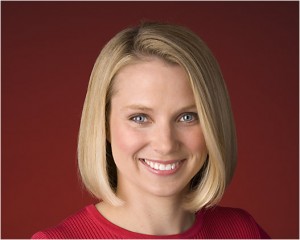 Marissa Mayer, participating in her first Yahoo earnings conference call since becoming CEO, outlined a broad range of areas in which the company needs to improve.
Marissa Mayer, participating in her first Yahoo earnings conference call since becoming CEO, outlined a broad range of areas in which the company needs to improve.
“It was an active and solid quarter with some nice achievements,” said Mayer, who came to Yahoo in July after a sterling career as a top Google executive.
Revenue was US$1.2 billion in the quarter ended Sept. 30, 2012, down 1 percent year on year. Subtracting commissions paid to advertising partners, revenue was about $1.08 billion, matching the consensus expectation from analysts polled by Thomson Financial.
Net income ballooned to $3.16 billion, or $2.64 per share, after a net gain of $2.8 billion related to the company’s sale of part of its stake in Alibaba Group back to the Chinese company. That compares to net income of $293.3 million, or $0.23 per share, in 2011’s third quarter.
Excluding the Alibaba shares transaction, Yahoo still increased its earnings to $0.35 per share and topped analysts’ consensus expectations of $0.26 per share.
She said the company is encouraged by what it considers a “stabilisation” of display and search ad revenue, but warned that it will take “multiple years” for Yahoo’s revenue to exceed the growth rate of all the markets in operates in, which is her goal.
After subtracting partner commissions, display advertising revenue was $452 million, flat year on year, while search advertising revenue came in at $414 million, up 11 percent.
In the meantime, she promised that customers, partners and investors will see measurable, concrete and consistent progress toward this goal. The third-quarter results, she said, provide “a solid foundation on which to grow.”
For the sake of comparison, the U.S. online ad market grew 14 percent in the first half of this year to $17 billion, according to a recent study sponsored by the Interactive Advertising Bureau (IAB) and conducted by PwC US. Search ad spending grew 19 percent, while display ad spending rose 4 percent, compared with 2011’s first half.
Mayer stressed the importance of mobile and said Yahoo’s mobile offerings and usage have been “growing nicely.” She highlighted as achievements in this area a redesign of the Yahoo mobile search page in 23 countries and an updated version of the Flickr application for Android mobile devices.
However, she said the company needs to do more in the mobile arena. “We’ve made progress, but Yahoo hasn’t capitalised on the mobile opportunity,” she said. In particular, the company hasn’t effectively optimised its websites for mobile, and it has “underinvested” in its mobile front-end development, she said.
Moreover, its mobile product lineup is too fragmented, with more than 76 different iOS and Android applications. “Our top priority is a focused, coherent mobile strategy,” Mayer said. This will involve a significant beefing up of the company’s mobile staff.
Regarding search, Mayer said that the revenue Yahoo is getting from its partnership with Microsoft remains below expectations, but Yahoo is still benefitting from existing revenue guarantees.
“While our search share is challenged, we’re working closely with Microsoft to define the future of search,” she said.
Yahoo will strive to grow its search market share, which is a top priority, by taking advantage of the opportunities the deal affords it to innovate independently on its search result pages, she said.
“There’s a clear upside potential here, and it’s time to execute against it,” she said.
Microsoft and Yahoo signed their 10-year search deal in mid-2009 and got regulatory clearance for it in early 2010. However, for a variety of reasons both technical and operational, the partnership hasn’t yielded the expected results.
When the deal was struck, Yahoo and Microsoft believed it would allow them to better compete against Google, which dominates search usage and advertising, but Google has maintained its position.
At a general level, the deal puts Microsoft in charge of Web crawling, indexing and ranking, and of self-serve, pay-per-click ad sales. Yahoo, on the other hand, agreed to pay Microsoft a commission for paid clicks on its own sites and partner sites, and to be in charge of selling premium, guaranteed search ads for both companies.
When the deal was signed, Yahoo estimated that, when fully implemented, the arrangement would boost its annual operating income by about $500 million, provide capital expenditure savings of about $200 million and increase annual operating cash flow by about $275 million.
Mayer also said she’s committed to Yahoo’s content business — both to its user-generated sites, such as Yahoo Answers, and to its professional content sites, which feature videos, photos and articles from partner media companies and Yahoo journalists. Improving personalisation of content and ads is key for Yahoo, she said.
At a corporate culture level, she said that she has pushed for a new emphasis on transparency and open dialogue with employees, putting in place tools to encourage feedback, systems to remove bureaucracy and new and aligned performance measurements for the company and its employees.
“These new systems are working to improve our execution,” she said.
Mayer said another priority is to hire the best people available, so it’s important to make Yahoo an attractive place to work. Already there are signs that this is happening, based on the increasing number of talented people expressing an interest in joining Yahoo, and on the rising number of startups wanting to be acquired, she said.
Since coming on board, Mayer has revamped Yahoo’s C-level suite, appointing new people to the chief operating officer, CFO, general counsel and chief marketing officer positions.
She became Yahoo’s third CEO in less than a year when she got the job in July. Carol Bartz, appointed in January 2009, was let go in September of last year after the board lost confidence in her ability to turn the struggling company around. Her replacement, Scott Thompson, a former PayPal president, only served between January and May of this year, leaving in the midst of a controversy about his college education credentials. Yahoo was then led by interim CEO Ross Levinsohn, a Yahoo executive vice president who left shortly after Mayer’s arrival.
Yahoo has been in a years-long financial and technology slump, going through several executive shake-ups and rounds of layoffs. It will be interesting to see if Mayer is the one who can finally lead Yahoo to recapture its leadership position in the Internet market, steering the company in a way that maximises the potential many believe it still has.





